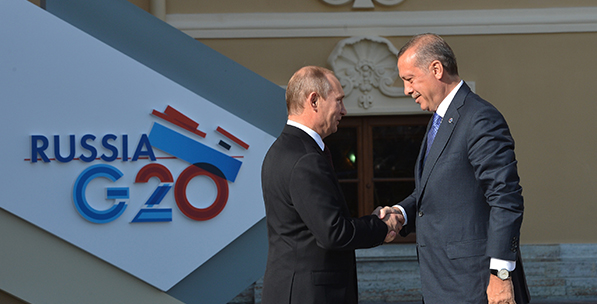As far as Turkey's increasing presence in international diplomatic and economic institutions is concerned, we are nearing a milestone development whereby Turkey will take up the rotating presidency of the G-20 in December of this year. In the context of the complicated architecture of global economic governance in which multiple institutions have divided responsibilities, the G-20 was conceived of as the premier forum for interstate cooperation. Although the group was established as an informal platform in 1999 following the financial crises of the 1990s, it was institutionalized after the global crisis in 2008 in view of the urgent need for coordination. The main motivation for the G-20 was the growing recognition that emerging markets and developing countries (EMDCs) were not adequately represented in the main platforms of global economic governance despite their growing share in the world economy. Therefore, following more exclusive precedents such as the G-7 and the G-8, the G-20 was structured as an inclusive platform that brings the leaders and economic policy makers of industrialized economies and emerging economic powers to the same platform. Despite ambiguities concerning its institutional structure, operational responsibilities and legal ties with other international bodies, the G-20 has been widely accepted as the locus of international economic cooperation since the Pittsburgh Summit in 2009.
The composition of G-20 members display an interesting mix of industrialized economies including the U.S., Germany, Japan, the U.K., France, Italy, Australia and Canada as well as the BRICS group of Brazil, Russia, India, China and South Africa. On top of that there are major developing economies such as Turkey, South Korea, Mexico and Indonesia and joined by Saudi Arabia representing major oil producers and the European Commission on behalf of the EU. Needless to say that this group is heterogeneous and includes members with conflicting national interests on various issues as frequently seen in quota allocation debates at the International Monetary Fund (IMF) or trade negotiations in the World Trade Organization (WTO). In fact, the G-20 brings together established actors in the global economic system who strive to somehow preserve the revamped Bretton Woods system and emerging powers who challenge it due to built-in injustices and problems of representation. Still, this hard to manage group collectively represents around 90 percent of global GDP, 80 percent of world trade and two-thirds of the world population.
The fact that Turkey will take over the presidency of the G-20 from Australia on Dec. 1, 2014 is a critical development in terms of Turkey's ongoing efforts to establish itself as a major emerging power with a strong voice on global issues. It is also important for the G-20 in that a developing economy with strong links with European as well as African, Middle Eastern and Central Asian markets will contribute to the inclusive image of the group. During Turkey's term in the presidency, the processes of agenda setting must be effectively used by Turkish policy makers so that new channels of economic diplomacy can be opened and novel contributions to global governance can be made by raising the demands and aspirations of developing countries at the highest level.
The G-20 presidency consists of a three-member group that includes previous, current and future chairs (the Troika) and the agenda setting process comprises a legacy component - items that come from former presidencies - a cyclical component - items that reflect current economic issues - and an idiosyncratic component - items that reflect the national perspective of the presidency. It is the last component through which Turkey could make a difference by pushing for gradual global governance reform, development-friendly international norms and democratization of international decision-making mechanisms. This is in tune with the new Turkey conceived as a strategic actor on global platforms that can formulate innovative and inclusive r






